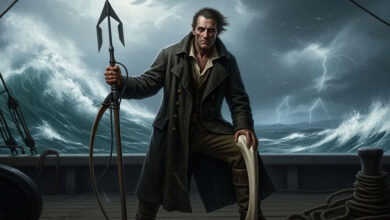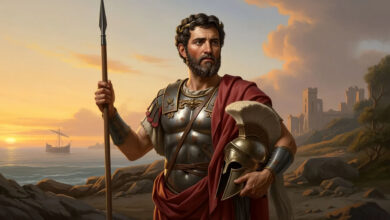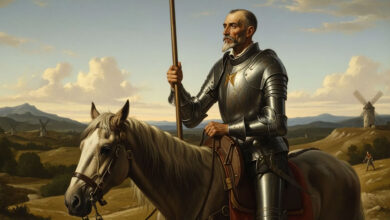In the decades before the American Civil War, when the Mississippi River was both a frontier and a lifeline, a boy named Huckleberry Finn drifted down its currents and into legend. Born poor, restless, and suspicious of authority, he became one of the most recognisable figures in American folklore, not because of wealth or power, but because of his stubborn devotion to freedom and his instinctive sense of right and wrong.
Early Life on the Frontier
Huckleberry Finn was born around 1835 in the small river town of St. Petersburg, Missouri. His mother died when he was young, and his father, known locally as Pap Finn, was a violent drunkard who drifted between labour jobs and petty theft. With no stable home and little schooling, Huck learned early to fend for himself.
He spent his childhood along the riverbanks, sleeping in barrels or on doorsteps, fishing for food, and dodging his father’s fists. Townsfolk pitied him, but few offered real help. In the rough democracy of the frontier, where reputation was everything, Huck’s ragged clothes and unruly manners marked him as an outsider. Yet beneath his dirt-streaked face and quick grin lay a sharp intelligence and an independence that no upbringing could smother.
The Search for Freedom
Huck’s first taste of ordered life came when the Widow Douglas and her sister Miss Watson took him in, determined to “civilise” him with clean clothes, prayers, and school lessons. Though he respected their kindness, he felt trapped. The small routines of domestic life, bedtimes, manners, and church, were cages to a boy who had grown up with the river’s endless horizon as his playground.
His father’s return forced a crisis. Pap Finn, enraged that his son was being educated and well-treated, seized him and dragged him to a log cabin in the woods, intending to reclaim authority, and Huck’s small inheritance. Huck endured months of captivity before escaping one night by faking his own death. The act was both desperate and ingenious, marking the beginning of his journey toward self-discovery.
Life on the River
Fleeing along the Mississippi, Huck encountered Jim, a man enslaved by Miss Watson who had run away after learning he might be sold south. Their meeting transformed both their lives. The two fugitives, one white, one black, found in each other a bond stronger than society’s divisions.
They built a raft and drifted through the heart of a divided America. The river became their world, a place of silence, danger, and reflection. By day, they hid among willows or floated lazily in the current; by night, they shared stories beneath the stars. Huck, raised among men who treated slavery as natural, began to see the hypocrisy of a world that called itself Christian while denying humanity to others.
His moral awakening came quietly. When faced with the choice between betraying Jim or breaking the law, Huck chose friendship over obedience. “All right, then,” he famously said to himself, “I’ll go to hell.” To him, it was no heroic declaration, merely the decision to follow his heart when every voice around him said he was wrong.
Trials Along the Way
The river, for all its beauty, was no sanctuary. Huck and Jim faced storms, shifting currents, and the constant threat of capture. Onshore, the pair encountered every shade of human greed and folly: feuding families whose pride led to bloodshed, con artists masquerading as royalty, and towns still poisoned by the cruelty of slavery.
Huck’s quick thinking saved them more than once. He learned to spin lies as easily as he once skipped stones, disguising himself as a girl, a servant, even a runaway apprentice. Yet each deception left him uneasy. Freedom, he discovered, required honesty, not with others, but with oneself.
After months on the river, a collision with a steamboat separated the companions. Huck’s wanderings took him deep into the plantations of Arkansas, where he saw more clearly than ever the moral rot that slavery bred. When he and Jim were finally reunited, it was through luck, loyalty, and Huck’s refusal to give up on his friend.
The Return and Restlessness
Eventually, their odyssey ended not with triumph but with exhaustion. Jim gained his freedom through legal means, and Huck found himself once more at the threshold of civilisation, offered comfort, education, and safety. But the boy who had slept beneath open skies could not abide walls for long.
In his final known account, Huck spoke of “lighting out for the Territory”, heading west, where the land was still untamed and a man might live without hypocrisy. Whether he ever reached those distant plains is uncertain. Some say he worked on steamboats; others that he joined settlers in Kansas or vanished into the wilderness. What is certain is that he never truly returned to the world he had left behind.
Character and Beliefs
Huck Finn’s character reflected the contradictions of his age. He distrusted authority yet valued honesty, mocked religion yet lived by a moral code stronger than that of most preachers. His view of the world was simple but profound: people were good or bad by their deeds, not by their rank, race, or reputation.
Though often described as uneducated, he possessed a natural intelligence born of observation. He could read a storm, interpret a stranger’s expression, and sense danger in a tone of voice. His humour and adaptability made him both survivor and philosopher.
Historians of the period view him as a symbol of the American frontier spirit, restless, sceptical, and unwilling to submit to convention. Yet his empathy, particularly toward Jim, transcended his time. In an era defined by division, he acted according to a sense of shared humanity that placed him decades ahead of his contemporaries.
The River as Destiny
To understand Huckleberry Finn is to understand the Mississippi River itself. Stretching from the northern forests to the Gulf of Mexico, it was the spine of a nation, beautiful, dangerous, and always moving. The river carried Huck not just from one place to another but from ignorance to understanding, from boyhood to moral adulthood.
On his journey, the river served as a teacher and a mirror. Its floods and calms reflected the turbulence of a country torn between freedom and bondage. To the boy adrift on his raft, the current was both companion and judge, reminding him that the only constant in life was change.
Legacy
By the time of the Civil War, the story of Huckleberry Finn had become a folk legend retold in river towns and frontier camps. Some remembered him as a trickster, others as a runaway, still others as a prophet of conscience. His tale captured the contradictions of a nation learning, painfully, what equality really meant.
Educators later held up his moral decision to protect Jim as one of the earliest expressions of individual conscience in American history. Abolitionists, humanists, and writers of the next century would cite him as proof that even a child raised in ignorance could recognise injustice when he saw it.
The “boy from the river” became an emblem of youthful integrity, a reminder that morality is often clearest in those least corrupted by civilisation. His story, though rooted in one time and place, continues to speak to every generation that struggles between social expectation and personal truth.
Historical Reflection
Huck’s life embodies the broader American frontier movement. He represents the transition from the old world of rigid hierarchy to the restless democracy of the new. His suspicion of authority echoed the growing distrust of institutions that would shape the nation’s politics and culture.
At the same time, his friendship with Jim marked a quiet revolution in moral understanding. It suggested that decency was not a matter of law but of empathy, a truth America itself would wrestle with for generations.
Historians still debate his fate. Some imagine him settling somewhere beyond the Mississippi, a grown man telling stories to children by a campfire. Others believe he never stopped travelling, chasing the next horizon as if the river were still beneath him. Perhaps that uncertainty is fitting. Huckleberry Finn was, above all, a wanderer. To know his ending would be to confine him, and he belonged to no one.
Final Word
Huckleberry Finn remains one of the most enduring symbols of freedom in American history. His life reminds us that morality is often found not in laws or sermons, but in quiet acts of compassion. He was poor, uneducated, and perpetually adrift, yet his moral compass pointed true when the world’s did not. In following the current of his own conscience, he showed that real courage is not the absence of fear but the ability to act rightly when all others are wrong. The boy who lit out for the Territory still rides the river in the imagination, forever young, forever searching, and forever free.
Huckleberry Finn FAQ
Huckleberry Finn was a boy from Missouri who travelled down the Mississippi River, known for his independent spirit and moral courage.
His story reflects 19th-century American society and explores themes of freedom, justice, and conscience during the age of slavery.
Huck represented honesty and independence, choosing friendship and morality over society’s corrupt expectations.
His life took place in the decades before the American Civil War, when the Mississippi River was a gateway to both opportunity and oppression.
His journey teaches the value of empathy, the importance of questioning injustice, and the courage to follow one’s conscience.




